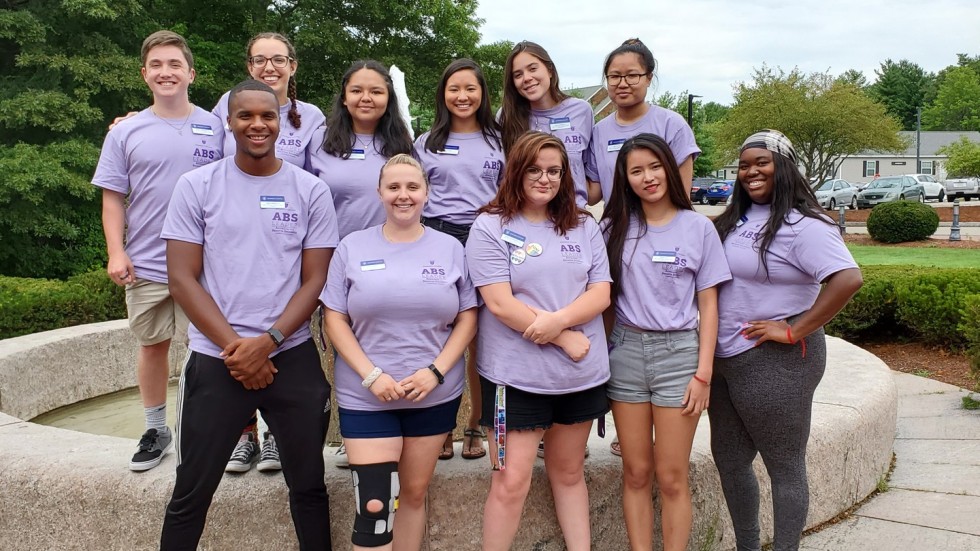A Brighter Stonehill
320 Washington Street, Winter | Spring 2020

ABS LEADERS: [Pictured above, front, l to r] Jhonel Roberts ’20, Briana Ingraham ‘22, Trisha Goldsborough ’22, Taylor Li ’21, Marnie Walsh ’20. [Back, l to r] Emmett Tweeddale ’20, Gwyneth Gould ’22, Maria Toapanta ’22, Elizabeth Blake ’21, Ana Clara Alcantara ’21, Emily Yip ’22
New program serves as a resource for underrepresented communities on campus.
Starting college is stressful for everyone, but the experience can be especially challenging for members of underrepresented communities, including students of color, first-generation college students, international students, and LGBTQ+ students and allies.
Enter Advocates for a Brighter Stonehill (ABS), a program conceived as a resource for addressing issues of social justice and diversity in underrepresented communities as well as the Stonehill community at large. ABS is overseen by the Office of Intercultural Affairs and is comprised of a dedicated cadre of student volunteers who serve as student leaders and role models.
Students interested in joining ABS must apply for admission and complete a rigorous training program that prepares them to lead and mentor other students. Once trained as leaders, they attend and support the planning of Stonehill’s Intercultural Experience Program (IXP) together with a series of diversity and inclusion programs throughout the year.
“Our ABS leaders are important facilitators of the IXP experience,” observes Office of Intercultural Affairs Director Latesha Fussell. “Each fall, we welcome a group of approximately two dozen, self-selected first-year students who come to campus early to learn more about social justice and social diversity issues. We pair our ABS Leaders with IXP participants in a big sibling/little sibling arrangement. We find this approach helps new students connect with others in our college community and feel more at home.”
Members of underrepresented communities, particularly students of color and first-generation college students, are often at risk because they may be unfamiliar with how to navigate college, Fussell continues, so facilitating connections with other students is especially important. “Research has shown that engaging students in their first six to seven weeks on campus can help with retention,” she explains.
Not surprisingly, these connections are equally important to ABS volunteers. Marnie Walsh ’20 has been a leader in the program since her sophomore year and served as a coordinator this past year, a role that entailed additional responsibilities.
“When you truly listen to people’s stories and what they’ve been through, you grow.”
—ABS Leader Marnie Walsh ’20
“As a person of color, I wanted to be a resource for first-year students,” she says, “but the program also enriched my college experience. When you truly listen to people’s stories and what they’ve been through, you grow. It’s inspiring to hear students’ life stories and their hopes and dreams for their time at Stonehill.” Serving as an ABS volunteer has also enhanced Walsh’s education. “I loved the training—it got me out of my comfort zone and built my public speaking skills—and the relationships I’ve built with peers and other ABS leaders are special.”
ABS coordinator Emmett Tweeddale ’20 agrees. “IXP and ABS offer a great way to get new students on campus early and allow them to get to know one another. Participants in our program frequently make friendships that carry them through all four years at Stonehill.”
—Lori Ferguson
